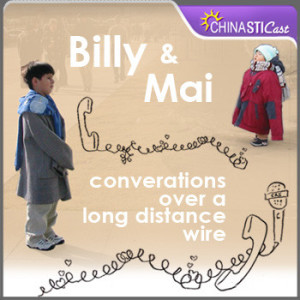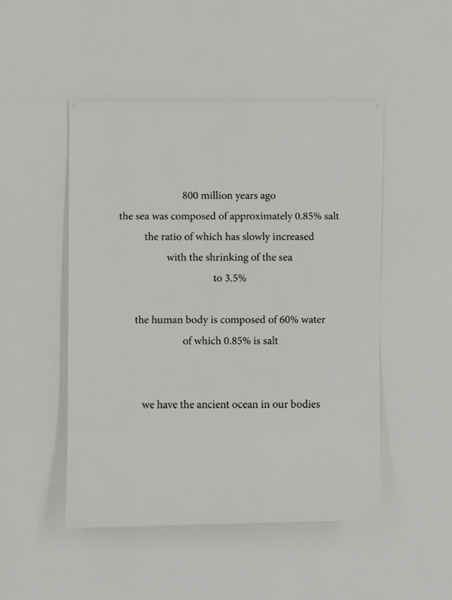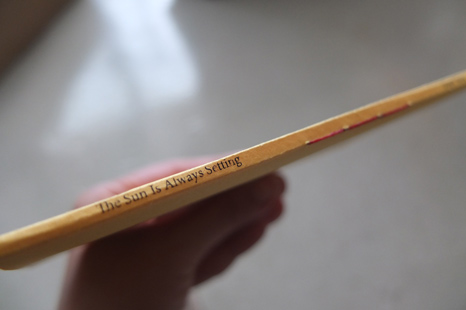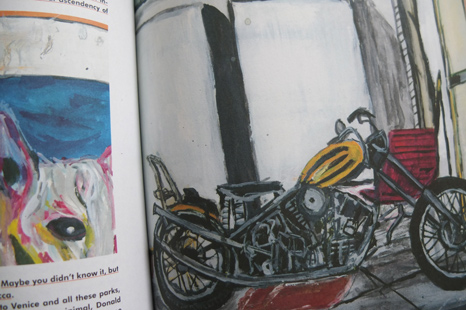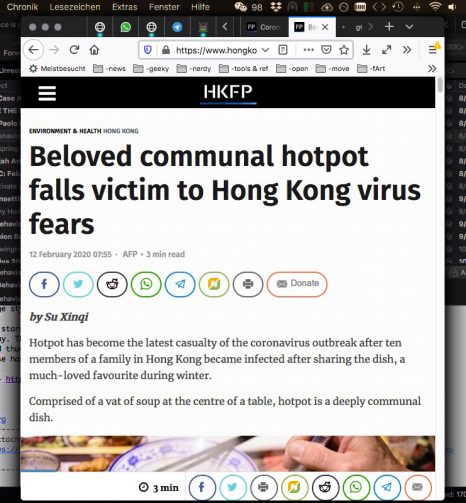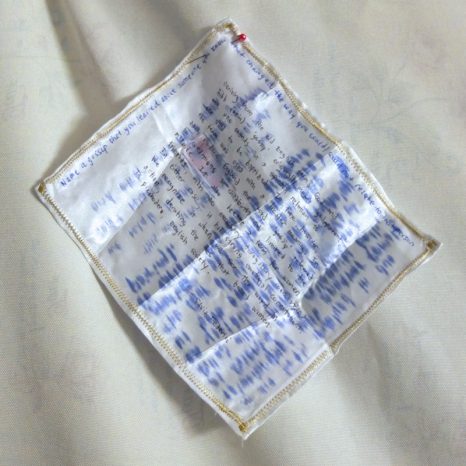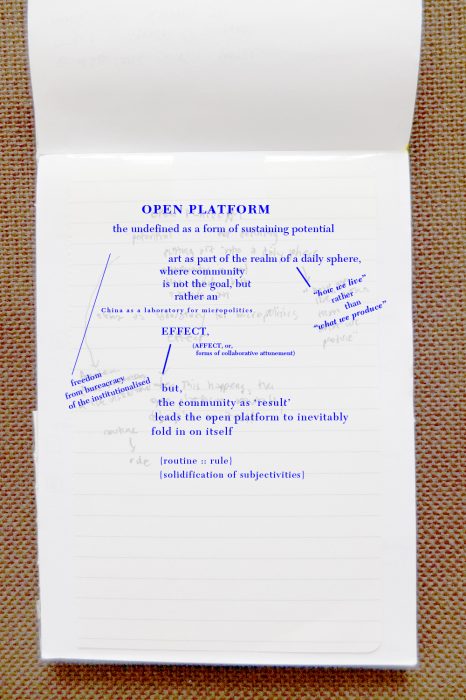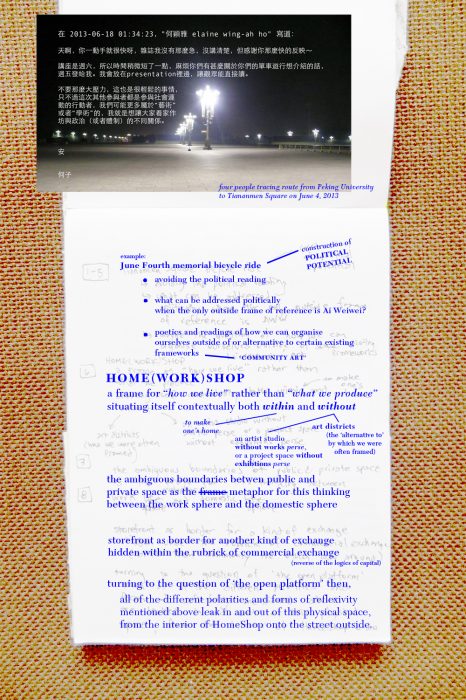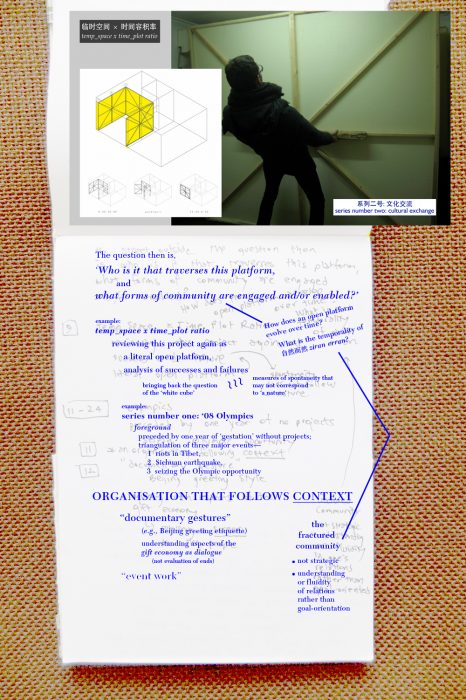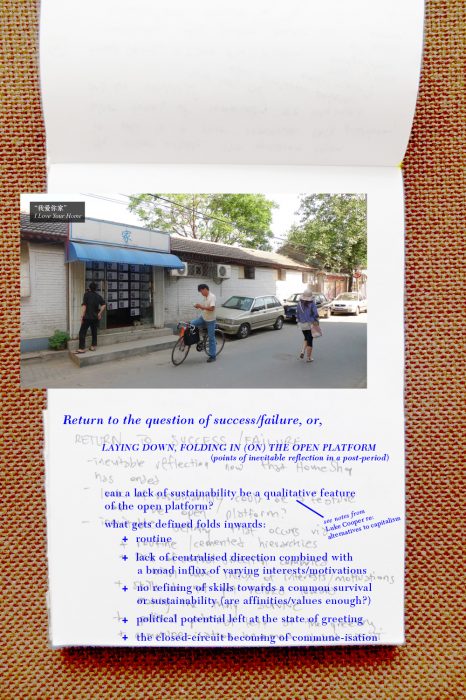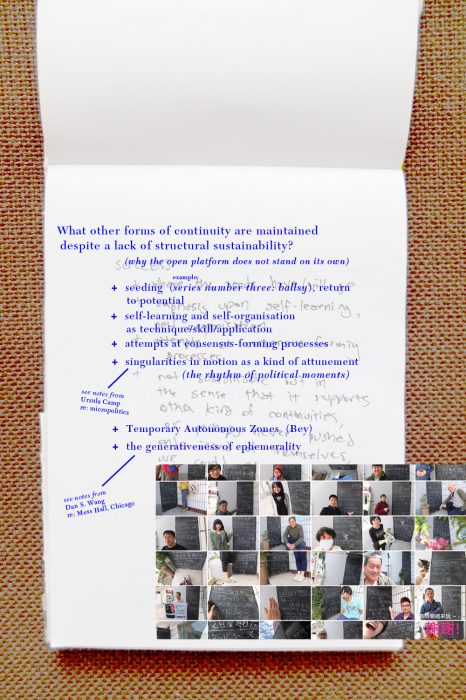🐢 點iwishicoulddescribeittoyoubetter發起的時候參與者haxi,今天GOODBYE過去時考古還能挖出來這樣的一個回憶 💓!05年在北京我第一份工作是給國際廣播電台做一系列英文播客。像haxi所說的,「在pre微博、pre微信、pre移动互联网时代,我们还做过这样一个东东。[😎旺柴😎] 」miss erminia,我電腦上有第16期,很想聽一下「💩 OHMYGAWD, I STEPPED IN POO 💩」那期,你有嗎?⋯⋯OHMYGAWD 🎶 GOODBYE 2021,想你們呀~
Posted by 丫 | reply »
小船 Boat
With the exception of one fateful date, the four other exercises that I designed for Visual Diary Archive were each put together with a specific person in mind. I don’t speak to any of them so often anymore, and with distances, it sometimes becomes difficult to know where and how to begin again. Words don’t always bridge gaps, and perhaps neither do images, but if a series of exercises incite certain actions, I wonder what new thoughts, imaginations or understandings may be filled in the spaces between us.
The other quandary or surprise this brings us is the question of participation. It was because of a lack of general participation that I decided to ask a single person to respond to the exercises for me, and since each exercise had also been addressed to a singularity, it somehow made sense for this text-based response to be as well. So this is for Boat——less far, but also some distance away. I thought we would be connected by the expanse of sea next to our cities, but after checking the map I realised that the water where you are has a different name than the water where I am, even if water is fluid and I don’t want to believe it has bounds.
…
Nina and Asako made a work together in 2014 called The soup of a body past: notes on evaporation. Here is an image of the text that was printed and hung in the space:
And so I think now, along with Fotini and pictures of words, of the similarity between water and thoughts flowing between us, like ancient salts that both wound and heal us over time. Do you know the English idiom about rubbing salt into someone’s wounds? It means to make a bad situation worse, to aggravate it.
When we talked recently about togetherness, about how to participate in a project about being together, it felt almost like salt, like our non-togetherness being amplified by discussing it, and after that long back-and-forth of messages, I cried, alone. It felt bad, but maybe like the tolerance for salt, alcohol, and drugs, resilience grows with experience, so I really cannot say it was an overly aggravated situation. Unlike the connoisseur, after all this time I would prefer to make less judgements about who and what are wrong or right or bad or good. But maybe we can keep searching for new words or images or thoughts to simply keep describing the taste of these things. Like the quandary or surprise of your participation, I want to meet something outside of myself and get to know it better.
What I mean is, if it was a less than ideal situation that hardly a soul volunteered their images or words to this project, maybe it was kind of salty to finally see your contributions——several being what I saw as misunderstandings of the instructions. I think anyone who has asked anything of anyone else will know this taste. Let’s call it the strange flavour of ‘participation’ or ‘getting others to do things’, together or not. Sometimes it comes in the form of ‘collaboration’ (what Eyal Weizman calls the ‘very absolute extreme’ of participation), sometimes ‘coercion’ (what parents sometimes have to do to get their children’s compliance), and very often ‘compromise’ (what we as independent, less than star practitioners have to do within the systems that we would often rather confront). In this instance, there are two layers of participation: one requested from a general audience on the Internet; and secondly, the participation from you, which was performed as a favour to me. Both may be described as the kind of slightly disappointing or wounded salt of things not happening as were expected, but maybe I have to suck on this a bit more, to allow a passage of flavours to come through in engaging with that (non)participation. Something more like the 鹹梅 salty plums I used to love when I was a child——sour, sweet, bitter, savoury and salty.
So if I am to try to take in these five images you posted just a little bit longer, yes, some things made me squirm a little bit, or laugh, doubt, affirm, feel perplexed, and/or smile. The date 2020-06-30 got replaced by a longing for Shanghai about one year earlier, and it felt at first like a betrayal to all that 2020-06-30 means for Hong Kong. On the date of your photo, 2019-05-26, chosen for some other reason of which I am not aware, things had actually already begun boiling here. You, living next to waters with a different name, are not expected to have known that. And so your participation with rain in another city on another day defuses the centrality of importance, like maybe the way that rain probably was once a particle of air which was once part of an ocean with a wholly other name.
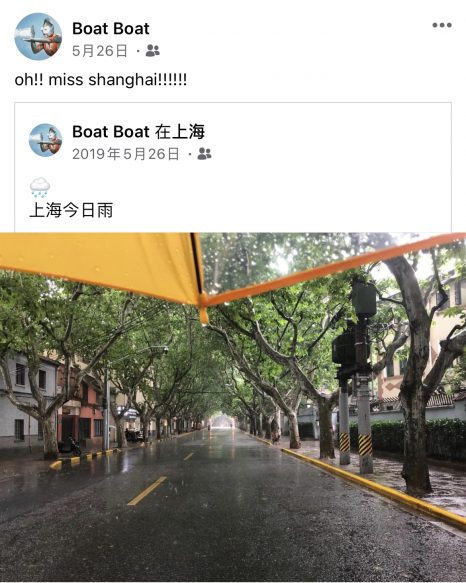 Submitted to Visual Diary Archive by 張小船 Boat Zhang for 2020-06-30
Submitted to Visual Diary Archive by 張小船 Boat Zhang for 2020-06-30
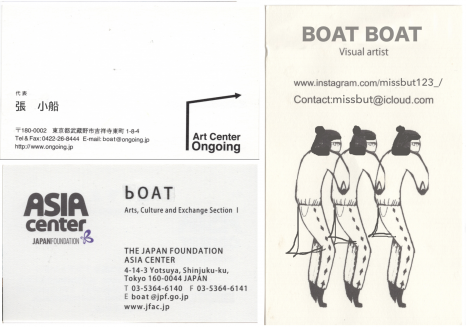 Submitted to Visual Diary Archive by 張小船 Boat Zhang for Fotini
Submitted to Visual Diary Archive by 張小船 Boat Zhang for Fotini
But you want us to know your name. 張小船, big B – big O – big A – big T (x2), little b – big O – big A – big T. I had initially imagined the Fotini exercise to locate searches for meaning, like when we take photos of pages from books to replace taking notes, or record signs as a way of remembering. You’ve shared yourself with us here, in a few guises but you all the same, funnily captured in a print format that is mostly outdated, though it makes sense in the context of you living now in Japan and with what I had asked you before in an audio recording also dedicated to you. So yes, ‘a lot of Boat’——meaning, and a string of things to remember.
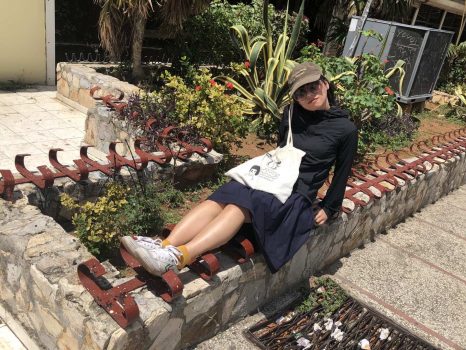 Submitted to Visual Diary Archive by 張小船 Boat Zhang for 京蘊 Anouchka
Submitted to Visual Diary Archive by 張小船 Boat Zhang for 京蘊 Anouchka
You appeared again with Anouchka, and it was so surprising to see you, ordinarily so shy, now leaning back in this very forthright position, looking at the camera confidently, even if hidden under a cap and sunglasses. Those metal bars must be the Cuban counter to the kind of structures they put in the parks and underpasses of Hong Kong——manmade objects to keep people from public spaces. No loitering, no sitting, no sleeping. But there you are, sitting defiantly on top of them, and though it must be quite uncomfortable, you reveal in the caption the immunity offered by being in the eye of a crush. Now he is crushed in prison and your small secret opened up in the maze of someone else’s archive.
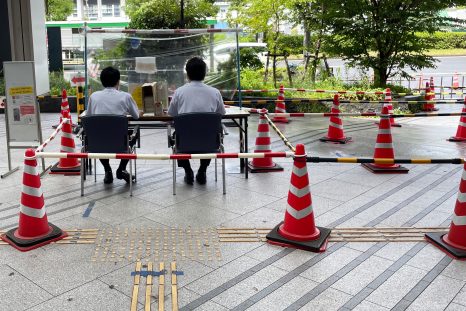 Submitted to Visual Diary Archive by 張小船 Boat Zhang for Nisan
Submitted to Visual Diary Archive by 張小船 Boat Zhang for Nisan
Nisan would probably not be pleased that I’ve translated her idea for a continuous line among discrete objects in this way. So maybe it is fitting that your image leaves a very small gap in the line, which, if we were to put together with the other photos, would break the horizon. It’s not certain whether this subtle subversion on your part was purposeful or simply a visual opening of the ‘rules of participation’, but I’m glad it would be you to do it, just as I am thankful that it would be you to tell me during a long and painful back-and-forth all the horrible things that have gone astray and still be my friend.
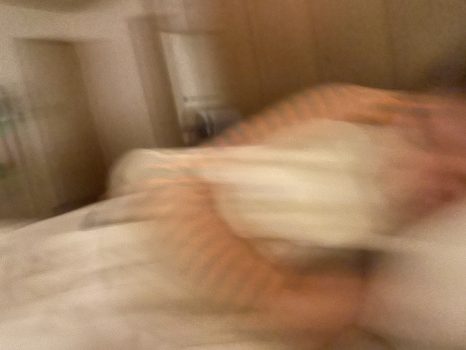 Submitted to Visual Diary Archive by 張小船 Boat Zhang for Nina
Submitted to Visual Diary Archive by 張小船 Boat Zhang for Nina
And maybe that’s why the last one, Nina, is the one to end on, because it’s another intimate space between you and a lover. This time you are the photographer, but for all the power within that role it is a sudden fear from the sudden movement of his sleeping body that clicked this shutter. And this is quite a complex story for a mistaken photograph——at least compared to the majority that I had collected and cannot place at all except by virtue of the photographs taken before and after. Your photo for Nina bears similar warm tones as the ones that she has collected in her archive, though hers are mostly created by the redness of light seeping through skin.
…
I want thousands of beads of sweat from my body to seep through my skin and slip into an ocean that has one name on one side and another name on another. Sometimes these oceans are named after people, while you, on the other side from here, are named after the vessel that keeps us afloat on the sea. It was the most cheeky and romantic of things for your parents to do, but like these images, what I like most are for these smallest of intimacies to be laid bare in a plain space for anyone to know and see, the most subtle invitation for participation. An act of taking notice.
And after those long hours of talking about ‘getting people to do things’, it is still difficult to come up with answers. But you contacted me tonight as I wrote this text, asking for a favour.
So for now——simply——yes, of course.
Posted by 丫 | reply »epistolary formations (for Ĵ, Ş, Ȼ and Ḅ)
dearest yous,
digital crumbs here in response to those things you said, those things you sent, real material ways and a digital means. ‘i am sorry for the delayed reply’ prefaces so many of these formations, followed mostly by the mental hesitation for apologising too much. though it’s nice to hear ‘no need to apologise’ in response sometimes, it takes a sorry to get there. truly sorry for too many things.
lateness somehow psychologically necessitated a more involved response, if this so-called ‘publicness’ can warrant any more meaningfulness. actually i told Ḅ that what i like most here is the anonymous intimacy of passerby in public, because being an outmoded place, it’s hidden in plain sight, Emily Dickinson style. there was a period when i wrote little notes and left them in random places, too, and i found one a few years ago that didn’t get distributed, so sent it to Ẳ in the post along with a bunch of other random things, but i think the clutter of it all overwhelmed her, so there was not much conversation about it afterwards. at the time, her son could just fit the quarter-sized sample jacket i made in fashion school.
so many things need explaining.
and your faith astounds me sometimes. but i guess we still make (it) work. it’s perhaps not so dissimilar——nudity in public, intimacies for those who were never keen at p.d.a., the weaning separation from one’s body that is called a work.
Art is insufficient to narrate the inhumanity of history, because it is insufficient to explain it. Disaster is either explained by means of psychology, or the savagery of society is described as if it were a supernatural event; fascism is presented ‘as the machination of rackets outside society, not as the coming-to-itself of society as such.’
-from The Orpheus Double Bind: What Can Writing Save?, Nurdan Gürbilek
and what would you say to those that don’t watch films, don’t really read books, don’t dance? aren’t they terrible, those people, how are you going to explain it to them? how are you going to wish for them the thing that changed you and you don’t regret it not one bit, except all the times you fail to explain it to your stern mother or that person in power that you wanted to impress. you’re sorry.
Ş, i like the digitised irony that your rooms reminded me of playing Hitchhiker’s Guide to the Galaxy, or growing up choosing my own adventure——though you don’t say ‘you’. but something like she says, it wasn’t birds but paper speaking——your real, material and actual post, Ş, so carefully bound by hand and sent to me across the Pacific just as you said you would, when most people don’t. and with that I have to tell you, unapologetically sorry, that I haven’t forgotten what I said I would send to you. it’s not ready yet, hopefully soon.
“Time the Great Healer (live at the Boston Museum of Fine Arts, 5 September 2006)”, Cat Power
though today i put off work to deal with a number of personal matters. and really that is an irony as well, as if they were separate in these realms, you know what i mean, but again it’s something about still learning to explain after all this time, i have to reiterate myself and you to yous again and again, because you weren’t listening and in my anger i don’t hear myself. maybe you’ll say i have to listen more in order to be heard. maybe.
i like that the package from Ĵ, one of the most dedicated in believing the romance of ‘art’ and ‘post’ all these years, came this time not directly from you but by the smooth spaces of guanxi through the editorial office of a magazine based in Spain. i like that you once fleetingly included me in one issue, and still hope that we’ll have that chance for a two-day dialogue over sidewalk beers some day.
“ピンクブッチ Pink Butch (ラララ Lalala)”, マジカル・パワー・マコ Magical Power Mako
i like that an e-mail from Ȼ seems so anachronistic amidst all of our other conversations online, that the tone differs by that very fact and that you’ve encouraged me thus to write poems in Chinese, like Ɀ also showed me, so simply, how line breaks make all the difference.
did i show you the poem he helped me to break?
每當你不在(身邊),我念及你的時候
總有許多的話,想要對你說
距離慢慢縮短,空間卻變得
越來越厚重
文字難以承載的那些話題
總與天氣有關
一種中間狀態,它從來不明白你
或者是我
我們侃侃而談
談論愛
卻總是不夠
— from the 視覺博物誌 Visual Diary Archive project “其人,其事:何京蕴 Just People, Just Timing: Anouchka”
and for Ḅ, who joined us most recently and 那麼有耐心 accompanied me 陪著我 so patiently on the 坐今天的山車 roller coaster of today:
Posted by 丫 | reply »
i saw the End of the Century
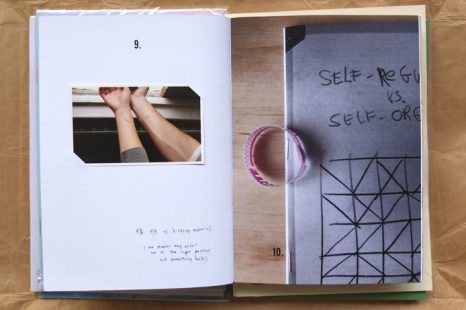 L and E with matching scar tissue, Arnhem 2001
L and E with matching scar tissue, Arnhem 2001
hallo, dear L,
Now that the cinemas have finally shut down (they tried their best to hold out as long as they could, seating only available in every other row), I could finally watch the end of the century go. And even if ever so subtle, it washed over me like the laps of a past self that had been thrown overboard so long ago, now cuddling up uncannily like the sound of the sea in a new moon darkness. Yes, as she said, “the way sounds, music, make you remember things you’d forgotten about yourself“.
I remember when you
(and everybody)
first got into skinny jeans,
but did you notice
that I was a bit deprecating about it?
It’s that self of we when we were more intertwined, so perennially you (is me, in admiration, is we, growing up together), and yet now grown into other realms. a wise father, still awkward (some of the cuts), still funny (still innocent), but more nuanced perhaps. It’s learning to speak from experience rather than in the voice of those we admire, just like you said. It is you, so perennially, ever you (they even look like yous), so much that i know you’ll laugh with me when i say that is a very gay man thing to do. Right around the end of the century you told me how you knew you were gay, and I can tell you from my woman’s experience that things on this end were not so straightforward, but that is me, and yous is yous. Those selves are another perception of time in a knowing-queer way, perhaps, and even so we can still be full of references (Buñuel, the assured knowledge of self in movement, so many conversations recalled, and a Barcelona to Linklater’s Vienna) because those are our experiences, too.
Amidst those fleeting points of reflective light that glimmer ever so often amidst now isolation, I was reminded to speak from a place of wisdom. Not to assume wisdom, but yes, to recall, revisit and retranslate those places we’ve been, the conversations we’ve had, and the feelings that have always been facts. Life, as she said (that someone else said), is less like the sturdy tree and much more like the weather. And fickle as that may be, we know beyond everything the colours of sunset and ensuing fall of temperature, the scent of rain, and those broad, striped gusts that ping the ear and make us hold tighter. That’s all there is. Weather, and wisdom. So let’s hold tight, as far away as we may be.
and on continuity:
a box-o’!
just slightly disappointed that it was
obviously empty—
javi drinking the last drop
repeatedly,
and ocho hesitantly taking it
still half full…
(or personality references?)
___
Fin de Siglo, now viewable online via Lucio Castro and/or a few links when you look for them.
Posted by 丫 | more »
Textual Notes PWSSSRFS…
(there are reasons to think about my body and hygiene these days)
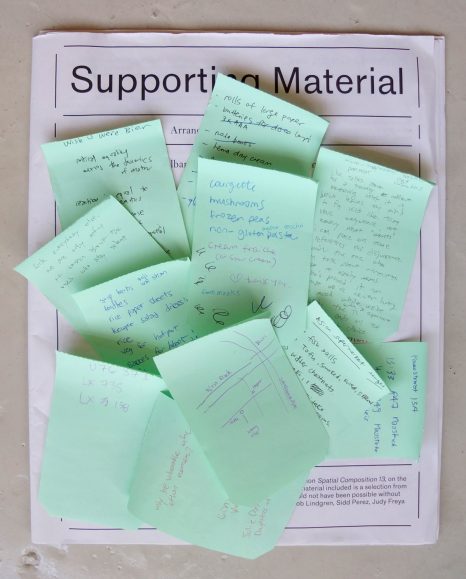
— Notes taken while on residency with Amy Suo WU at Motel Spatie; Arnhem Presikhaaf, 2020 January-February
In the time of that sojourn, a surface wound that stayed the entire time, irritated, flaming and hardened so much that it was narrated from being the oddity of a pimple on my hand to the paranoia of a wart-like abscess. It accompanied me during our conversations like a replacement for the biting of nails which had accompanied me since childhood, the extra psychosomatic conversation with myself to harmonise and discord with any other conversations going on in the room. And we spoke about intersectionality.
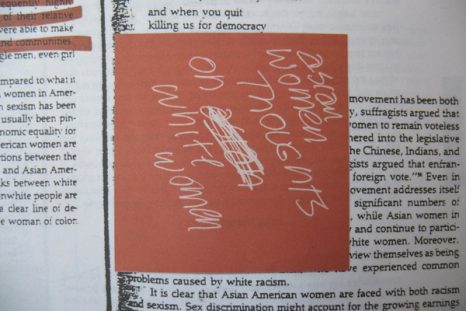
— from “Worlds in Collision: Multicultural Art History (Selection)” by Carlos VILLA, from Supporting Material by Celine CONDORELLI
I picked at it, making it bleed and scab over more than once, wondering if this would be the lifelong marker with which to remember this time. Other people get tattoos for such occasions, but somehow for me bruises, scars and mosquito bites were always enough. Sometimes I liked to think about the tiniest bit of spittle from an insect you never saw being smuggled transnationally, at peak seasons such that your body could carry two nationalities of mosquito saliva at the same time, recognisably different by the radius of red and degree of itch.
It was only a surface. But as my skin-scoring became manic, I remembered one of the first meals we shared together, when we were happy to find a few pairs of disposable chopsticks in the otherwise fork-and-knife-loaded space. A bit too brashly did I rip apart the two sticks and rub their ends together so as to smooth the rough edges in the way that we had learned, and somehow a little bamboo splinter had lodged itself into the meat between the thumb and forefinger of my right hand. This is the pressure point you are supposed to massage in order to release anxieties, and so it was that this residency——initially planned as an artistic labour——unfolded into my body subversively with a small army of histamines hardening a point known as 合谷 hégŭ, or LI-4. Like a pain to help release pain.
I had been telling everyone that it had been such a difficult year for me, or for most people in my context, rather, but now, when I had limited this sabbatical purposefully to run back into the fire, that heat seemed to flake away into something much more quietly insurrectionary, like the last hibernation before the end of the world. What were we gathering amidst these stories and meetings, me picking self-consciously at a surface wound on the back of my hand and scheming in those vague ways afforded by poetry? Would it be possible to be productive about this care in letting go, somewhere in between concern and a manic extraction of the conversation one has with oneself, parasiting off of the glimmers of knowledge and joy and jealousy of these people around me. So many intensities.
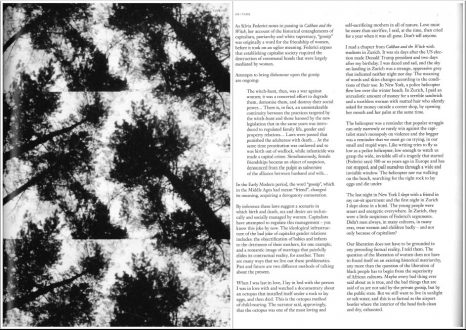
— “Witch-hunt: gossip has always been a secret language of friendship and resistance between women”, Hannah BLACK
In many parts of the world, women have historically been seen as the weaver of memory——those who keep alive the voices of the past and the histories of the communities, who transmit them to the future generations and, in so doing, create a collective identity and profound sense of cohesion. There are also those who hand down acquired knowledges and wisdoms——concerning medical remedies, the problems of the heart, and the understanding of human behaviour, starting with that of men. Labelling all this production of knowledge ‘gossip’ is part of the degradation of women——it is a continuation of the demonologist’s construction of the stereotypical women as prone to malignity, envious of other people’s wealth and power, and ready to lend an ear to the Devil. It is in this way that women have been silenced and to this day excluded from many places where decisions are taken, deprived of the possibility of defining their own experiences, and forced to cope with men’s misogynous or ldealised portraits of them. But we are regaining our knowledge. As a woman recently put it in a meeting on the meaning of witchcraft, the magic is: “We know that we know”.
— Witches, Witching-hunting and Women, Silvia FEDERICI
Among you, it becomes difficult to compare all that has been said to all that has not been said. All of these conversations. And these words are a conversation with those conversations, if not simply out of a question of translation but out of the need to make space for myself in this constellation of you(s) and me(s). To ascertain, like that book I took from your bookshelf: Feelings are Facts. We(s) would need to meditate through hours and hours of these discourses in order to sift though the medley of feelings that make up this moment, and that is a fact, too. Yes, as the witches say, “We know that we know“.
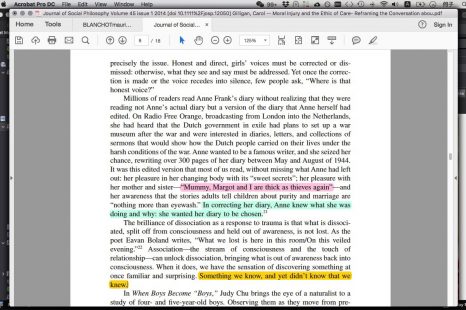
— “Moral Injury and the Ethic of Care: Reframing the Conversation about Differences”, Carol GILLIGAN
And maybe I know too many things. My head is filled with all sorts of banalities like the facial expressions of strangers and the taste of your favourite Grüner Veltliner and the prick of winter mosquitoes. Like the approximate sojourn of a piece of shit that appeared a few days after I arrived. It was the lack of anyone’s care to remove it from the narrow path between our residency room and the project space, making it such that you took the long route around every time, while I forged ahead to play hopscotch. I had the forethought that this dog I never saw had left the natural wastes of its circulating body just like the mosquitoes, and perhaps I should bring other contraband back this time as another memento of my stay. But an uncared-for poop was just a parallel temporary visitor like us to this space motel, and the day before I departed, what were now like hardened coal nubs finally blew away with that strange storm of not very much rain. Perhaps its winds were so great it blew its own rain away, a storm having a frightening conversation with itself. Its utterances came out like screeches and gales that shook the glass of our cove. From inside, we lifted our heads up in awe, and when we went outside we walked at strange angles with our heads down, pretending not to overhear. Buddha was also blown violently away that day, falling off of a neighbour’s balcony and left as an Asian corpse shattered in the white neighbourhood. In the beginning I kept thinking we would have been a strange sight here, our little crew, but actually there was nobody around most of the time, and we were left to play on our own like children at the slumber party. We stole time that way, turning their money and our own productivity into a space for taking care. Even so, I walked on that shit at least once, but you took time, and we cleaned up our tracks together. Self-quarantine, if you want to call it——I gained ten kilogrammes, too——but something else feels lighter because I know we had taken it on together. This takes space and so it was that ‘project ruimte’ was exactly that, not as the space for projects but a project to make space, as a fact of feelings between us——to read together with long pauses in between, to write letters from near and far, and to eat and resist the fallen communality of a shared meal out of one bowl. To be together and trust in someone else’s voice to guide when our eyes are closed.
I don’t know yet how to bring this space into visibility. And maybe it doesn’t have to, except as mischievous glances and giggles between those of us who know, and even if you don’t see us you will feel the smiles in our voices in that space behind your ears and in front of your neck——a tingling somewhere between an itch and a tickle to make chords and discords in you, too. Take care.
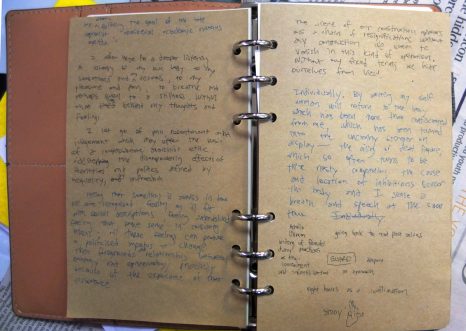
— Altered quotations and notes taken from the afwasdoekje reading group, PWSSSRFS No. 1, 2020 January 25
Posted by 丫 | reply »
首爾蘑菇筆記 Spore-adic Notes for Seoul
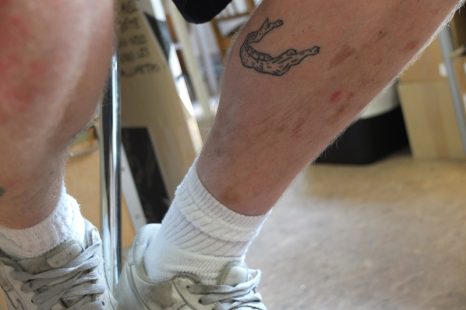 Y’s drawing appeared on his leg a few weeks later…
Y’s drawing appeared on his leg a few weeks later…
Having left out the exact words i had meant to express to her, i sent the e-mail a second time: “oh, before i meant to say: ‘and despite *my fear and nervousness*…’ ” Fear and nervousness to be left out at all costs, if we are to talk about serendipity. Except that it’s a silly word. Except that we couldn’t find the right word in Korean. Because 緣份 is more than serendipity, if we are talking about circles of time, letting things be, how we got here in the first place. I will try to forget about my fear and nervousness, to find comfort in someone else’s words, like D. says—“理論很舒服”。
It’s the resonance that she means here, and that is to say a——let’s call it ‘pleasant’——reverberation between the two.
(it’s funny how that’s never really so acceptable in art economies)
 from “Things That are Massively Distributed” by Alma HEIKKILÄ
from “Things That are Massively Distributed” by Alma HEIKKILÄ
Y.Y. and I.S. made an exhibition with the exact same name as our project a few months ago. I didn’t know, I really didn’t know! Clumsily avoided saying too much afterwards except the utterly boring, “I really liked your show”, and basically also delayed to read the accompanying publication, for fear of inadvertently finding too much resonance. But then one thinks they should be doing more research, the spores have already been released and——let’s take small comfort in numbers again——I.S. does write about three plus one becoming understandings of the word ‘catalogue’, so one and one and one and one…new appendages would be the point of these communiqué—let’s grow into our new eachother bodies.
(a question to you though, why does agency become automatically associated in singularities?)
 from “Catalogue Essay” by Isabelle Sully, Catalogue (Publication Studio Rotterdam, 2018)
from “Catalogue Essay” by Isabelle Sully, Catalogue (Publication Studio Rotterdam, 2018)
And then at the cusp of their heat wave, the one that makes a girl conditioned to heat and sweat giggle, other Girls Like Us picked up the same networks of drifting mycellium, and they deconstructed the magazine in another magasin, taking off and piling up, cushions and colours and all forms of care…

from the Girls Like Us workshop; A School, A Park 2018
We keep talking about things that spread and circulate. People, goods, ideas, memes, mycelia. All that fussing about, when actually the question of survival, of making a home (outdated concept?) is a very concentrated, tiny little thing. Like focusing upon words across lines, line to line, and all the networks in the world following through to that little nub at the end of a serif font. And of course it’s no end, Borges, the sentences continue, and your train of thought goes somewhere else. I’ve misunderstood you.

Dear Anna,
Today we had a very nice discussion centring around your book with our collaborators from Read-in and Kunci, and together we came up with a few questions to ask you:

M. has mentioned several times about needing to find out again the name of the Japanese scholar who talked about our Asian spinelessness. In Eastern ontology of print there was no spine. The book was a scroll. Does the spine allude to a ‘Western rigidity’ and an obsession with structure and order? “We have no spine but that will be something that we’ll talk about.”
(but to have the courage to talk about it, i’ll have to forget my fear and nervousness)
To mention in speech what somebody else has said is perhaps a way of ‘owning it’. Or what are the footnotes of speech? Can the simultaneity of attributions be translated in real-time, like ASMR tingles and little cartoon devils on shoulders? And what if you are the one who is really terrible at telling stories, at making the punchline of the joke work? No, I think I’m funnier in Chinese.
But what I really wanted to tell you about is something that has half-slipped my memory for at least ten years now, though the other half of it keeps coming up every now and again, like those waves of text while walking.
I read you here and I read you there, here and there, like a spore trapped in my memory because I will always remember the fuzz of something in the vicinity of you on the page. At the same time I know exactly where you are, left or right, a third of the way down…everything else in darkness as we rode a night bus through a foreign country.
— from the COVER; Hong Kong, Shenzhen and Guangzhou, Display Distribute『CATALOGUE』No. 3, co-edited with Kunci and Read-in
This one was somewhere about three-quarters of the way down, on some days it’s on the left side of the page, on others it’s the right. He talks about the linguistic typology of words that become true by virtue of their utterance——what are they called? In conjunction with this writing, I tried——as I do every once in a while when I want to ‘own it’, to track it down again. Weird keyword searches, scanning the possible PDFs. Tonight I realised that I must have lost the hard copy of that beloved book, the one that I think it’s in. But then I found only one sentence from the entire PDF version highlighted: “For human beings who have lost every sense of naturalness, each single gesture becomes a destiny.”
I won’t tell you who this comes from so that you’ll feel the same haziness as I do,
(remember my place on the page)
as if I was telling it to you in casual conversation while we are waiting together for something. Let’s own it. But anyway, it’s not the term ‘speech acts’. Though I saw that exhibition as well. If we should talk about our being-in-language, utterances to representation, yes, then my fear and nervousness comes back, a whole life gone by…destiny. and it circles back to 緣份. it must be circular, it must be circular, I say to myself. Not so grandiose as a speech act, but as small and tiny a little thing, like, “sigh…”
____________
* This post is also, in ever so slight variation, germinating another website called 圍群 Monument of Apron。
Posted by 丫 | reply »notes for the academy of failure, 25-27 May 2018 and a slew of logos to support
“Illegibility, then, has been and remains a reliable source for political autonomy.”
- James C. Scott, Seeing Like a State: How Certain Schemes to Improve the Human Condition Have Failed (1999)
it’s an easy preemptive manoeuvre, maybe as a way of saving face, because we have been so institutionalised that consciousness becomes a way of negating the negation. “let me tell you i’m a loser, let me tell you before you find out for yourself, and you can never get me.” what does it mean to precede and gestate one another?
if preceding was a manner of not being defeated by you (insertion of Super Mario anecdote here), gestation was a stalling grammar of potentiality, latent and shadowy, unbecoming. but how do we unbecome one another, with one another?
he says “欠” appears only when ego exists, but really i didn’t mind feeling indebted to you. the hat was out, and i wanted to ask you a favour because i knew you could ask me any time, even if you didn’t. i wanted you to know that i owe you a lifetime. that was my way of staying connected to you. it was only a pity that after i thanked you for that one, you simply left, without a thought in your mind. i was hurt and angry, i am hurt and angry …because i thought you owed me an apology? fuck!
we’re back to the peculiarities of voice, i guess (play with the pronouns)
“S. loved the paintings, but as she was praising them, she knew they didn’t stand much of a chance in the art world. If R. made the same work but was twenty years younger, had different friends and used different words to describe them, they would be viable.”
- Chris Kraus, Absolute Love (2016)
images above from notes initially taken to prepare for a talk given at the Collaborative Studies Program (CSP), organised by the Asian Culture Research Institute (formerly known as Asian Culture Information Agency in Asian Cultural Complex), Gwangju, South Korea, August 2014. This overloading of prepositions recontextualises a later refabrication of the notes into jpeg images called “(An) Open (and) Failure”, part of Squatting Knowledges: Failure/s in a constellation and as a tribunal, curated by DiscLab Research and Criticism (November 2014 until an unknown date when the site was removed from the world wide web for reasons not known)
---
何穎雅 Elaine W. Ho will be an adjunct lecturer at the Academy of Failure: Pedagogies for the Unsuccessful, 25-27 May 2018 in Beijing, PRC.
nusantao and a trans-pacific dialogue with Chris Kraus
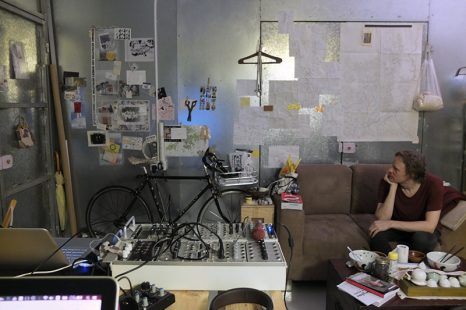
dirty south.
In a hypothesis developed by Wilhelm Solheim, the Nusantao Maritime Trading and Communication Network (NMTCN) is a trade and communication network that first appeared in the Asia-Pacific region during its Neolithic age, or beginning roughly around 5000 BC. “Nusantao” is an artificial term coined by Solheim, derived from the Austronesian root words nusa “south” and tao “man, people”.
— filed under “Nusantao”, Wikipedia
the spread in many directions as “a kind of excuse to party, right“, T. commented, and W. agreed, even though she was disappointed that nobody was listening, and even though she wanted to find some theoretical right to party, like a Brechtian sausage.
— 恩斯特·布洛赫
There would not have been a French Revolution, as Marx stated, without the heroic illusions that natural law engendered. Of course, they did not become real, and what did become real of them, the free market of the bourgeoisie, is not at all that which was dreamed of, though wished for, hoped, demanded, as utopia. Thus now, if a world were to emerge that is hindered for apparent reasons, but that is entirely possible, one could say, it is astonishing that it is not——if such a world, in which hunger and immediate wants were eliminated, entirely in contrast to death, if this world would finally just “be allowed to breathe” and were set free, there would not only be platitudes that would come out at the end and gray prose and a complete lack of prospects and perspectives in regard to existence here and over there, but there would also be freedom from earning instead of freedom to earn, and this would provide some space for such richly prospective doubt and the decisive incentive toward utopia that is the meaning of Brecht’s short sentence, “Something’s missing.” This sentence, which is in Mahagonny, is one of the most profound sentences that Brecht ever wrote, and it is in two words. What is this “something”? If it is not allowed to be cast in a picture, then I shall portray it as in the process of being (seiend). But one should not be allowed to eliminate it as if it really did not exist so that one could say the following about it: “It’s about the sausage.” Therefore, if all this is correct, I believe utopia cannot be removed from the world in spite of everything, and even the technological, which must definitely emerge and will be in the great realm of the utopian, will form only small sectors. That is a geometrical picture, which does not have any place here, but another picture can be found in the old peasant saying, there is no dance before the meal. People must first fill their stomachs, and then they can dance.
— Ernst Bloch
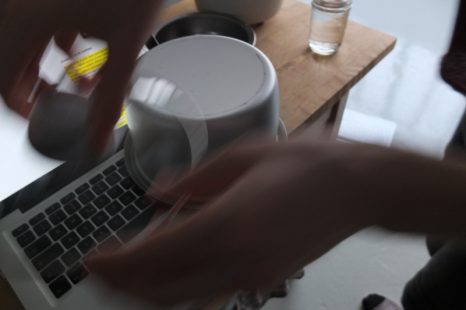
W.’s trauma of not being heard was a structural problem as much as a genetic defect, more recently amplified by contemporary notions of #fomo, post-maturity and the simple fear of being lost and forgotten and useful to no one.
S. was then of an age where she thought about age at least eight times a day. Having spent parts of her life in New York and LA, she knew where she was “from” didn’t much matter. When she was a student at Wellington High School, S. recalled being told by the head English teacher, a salt-and-pepper-haired man in baggy black-and-white tweeds who’d published critical essays on D.H. Lawrence, that because of her emigration from the US at such a formative age, she had no nationality and therefore, despite her interest in literature, could not be a writer [see further at 版本 version 3.0]. Which is to say, S. had lived through various eras including the demise of nationalism.
— from Absolute Love, by Chris Kraus (Scary Topiary Press, 2016)
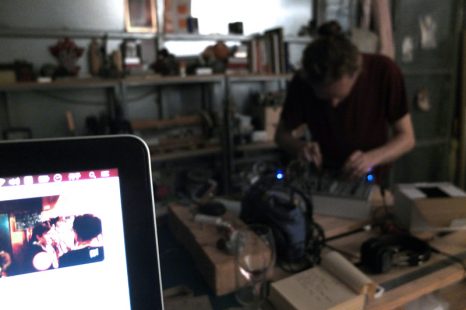
Unfortunately nationalisms have not really died if we are still looking for these genealogies of belonging, southern girl, and you empathised with O.’s alienation even though he talked about love and hate in a way that made you hate him. later, W. made a transnational gift of O.’s art object produced by W.’s semi-anonymous collective, her shy prefaces leading T. to make fun of W. because of her need to make a “finished product”. These are all various forms of trade and transaction, not so dissimilar from the way that cultures and identities and forms of belonging happen over time, across oceans. so while W. becomes a businesswoman she finally realises that her roots are not merely ethnic as much as gender-specific and class-based, contaminated, kind of like ‘dirty south’.
